All 7.7 million registered Michiganders will be sent absentee ballot applications ahead of both the August primary and November general election, one of the most aggressive moves yet to promote voting by mail in a major battleground state this year.
The mailings, promised Tuesday by Democratic Secretary of State Jocelyn Benson, are certain to be challenged in court by Republicans. They will cite past legal rulings in the state against government officials proactively sending out such unsolicited applications.
The burgeoning dispute could be one of the most important over easier voting during the coronavirus pandemic. How it's settled will help decide the presidential election. Democrats are counting on boosted turnout as their key to Michigan's 16 electoral votes, while GOP opposition to expanded voting options could help President Trump carry the state a second time.
Gov. Gretchen Whitmer, who remains high on the list of potential Joe Biden running mates, is keeping her stay-at-home order in place for at least the next two weeks except in two of the most rural regions in Michigan, which has the fourth highest number of Covid-19 deaths among the states at more than 4,900.
But no matter the pace of additional relaxation of the rules, and decline in cases, Benson said the public health threat will be significant enough for the rest of the year to make voting in person not recommended. Congressional, legislative and local partisan primaries are set for Aug. 4, and the Nov. 3 ballot will feature a hotly contested Senate race and four competitive House elections in addition to the presidential race.
Trump won the state four years ago by 11,000 votes, a margin of less than two-tenths of 1 percent, breaking a seven-election winning streak by the Democratic nominee. He and many in the GOP oppose expanded mail-in voting on the baseless rationale it creates widespread voter fraud.
The state and some local clerks were not sued when they sent out unsolicited absentee ballots to voters for local elections this month, when a statewide stay-at-home order was in place, but Benson says she expects her application mailings will get challenged.
Restrictions on gatherings and business openings may have been lifted by then. In addition, Republicans can point to a state Court of Appeals decision in 2008 that prevented the clerk of Macomb County, a bellwether Detroit suburb, from sending absentee ballot applications to every voter older than 60 on the grounds that state law does not explicitly grant "the power to mail unsolicited ballot applications to qualified voters."
Her response, Benson said, would be that the state's election laws don't prohibit it, either.
Michigan changed its rules only two years ago to allow absentee voting without providing an excuse, similar to the laws of 33 other states. The first test of the newly permissive system was the March 10 presidential primary, just before pandemic shutdowns began. Even so, 38 percent of the votes were cast by using the mail or drop boxes — up from 18 percent four years ago.
"The vast majority of voters across the political spectrum want the option to vote by mail," she said. "Mailing applications to all registered voters is one of the ways that we are ensuring Michigan's elections will continue to be safe, accurate and secure."




















